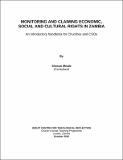| dc.contributor.author | Mwale, Simson | |
| dc.date.accessioned | 2020-06-23T10:17:06Z | |
| dc.date.available | 2020-06-23T10:17:06Z | |
| dc.date.issued | 2010-10 | |
| dc.identifier.citation | Mwale, S. (2010). Monitoring and Claiming Economic, Social and Cultural Right in Zambia. Lusaka, Zambia: Jesuit Centre for Theological Reflection (JCTR). | en |
| dc.identifier.uri | https://repository.jctr.org.zm/handle/20.500.14274/87 | |
| dc.description | This introductory handbook by the Jesuit Centre for Theological Reflection (JCTR) is written
with the aim of equipping Churches and NGOs working in Zambia with knowledge and skills to
engage with the government to comply with its international obligations on the realisation of
ESCR, and to intervene, prevent and/or stop the violation of ESCR. There is no doubt that
familiarity with issues such as scope, nature of State obligations, monitoring and documentation
of human rights violations, will help Churches and NGOs to conduct their advocacy and lobby
efforts of fostering implementation of ESCR in Zambia more effectively. | en |
| dc.description.abstract | One of the basic foundations of human dignity is the enjoyment and/or realisation of economic,
social and cultural rights (ESCR). ESCR are entitlements which guarantee that socio-economic
opportunities are made available, accessible and affordable by the State in order for the citizens
to live a life befitting a human being. It is therefore necessary that people enjoy their rights to
food, work, education, health and housing in order for them to live decently and to fully develop.
However, as one human right activist puts it, “when women and men cannot find jobs which
provide just wages; when people cannot afford to buy food or are unable to access food for
themselves and their families; when parents cannot send their children to school; when
individuals are not able to access basic health care services, this means that not only is their
existence inhuman, but also that their economic, social and cultural rights are violated”. These
negative conditions indicate failure on the part of the State to fulfil its human rights obligations to
its citizens and entail the urgency for citizens to claim their rights to realise their dignity. This is
why knowing one’s human rights is a necessary condition for people to claim and assert them.
Having a firm grasp and understanding of basic human rights concepts, principles and
approaches provide people with a tool that guide them towards appropriate action. | en |
| dc.language.iso | en | en |
| dc.publisher | Jesuit Centre for Theological Reflection | en |
| dc.rights | Attribution-NonCommercial-NoDerivs 3.0 United States | * |
| dc.rights.uri | http://creativecommons.org/licenses/by-nc-nd/3.0/us/ | * |
| dc.subject | Human Rights | en |
| dc.title | Monitoring and Claiming Economic, Social and Cultural Right in Zambia | en |
| dc.title.alternative | An introductory handbook for Churches and CSOs | en |
| dc.type | Book | en |

